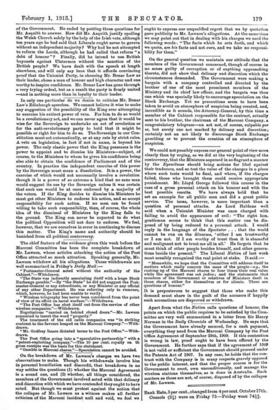In only one particular do we desire to criticise Mr.
Bonar Law's Edinburgh speeches. We cannot believe it wise to make any suggestion of the possibility of the King ever attempting to exercise his extinct power of veto. For him to do so would be a revolutionary act, and we can never agree that it would be wise for the Sovereign to undertake an act of revolution or for the anti-revolutionary party to hold that it might be possible or right for him to do so. The Sovereign in our Con- stitution must act automatically, or at any rate by strict rules.
A veto on legislation, in fact if not in name, is beyond his power. The only elastic power that the King possesses is the power to appoint and to dismiss his Ministers—subject, of course, to the Ministers to whom he gives his confidence being also able to obtain the confidence of Parliament and of the country. In practice the independent exercise of this power by the Sovereign must mean a dissolution. It is a power, the exercise of which would not necessarily involve a revolution though it is a power of so extreme a kind that no sane man would suggest its use by the Sovereign unless it was certain that such use would be at once endorsed by a majority of the voters. If the King decides to dismiss his Ministers he must get other Ministers to endorse his action, and so accept responsibility for such action. If no men can be found willing to take such responsibility, then, of course, the whole idea of the dismissal of Ministers by the King falls to the ground. The King can never be expected to do what the political Opposition will not dare to endorse. We feel, however, that we are ourselves in error in continuing to discuss this matter. The King's name and authority should be banished from all political controversy.










































 Previous page
Previous page